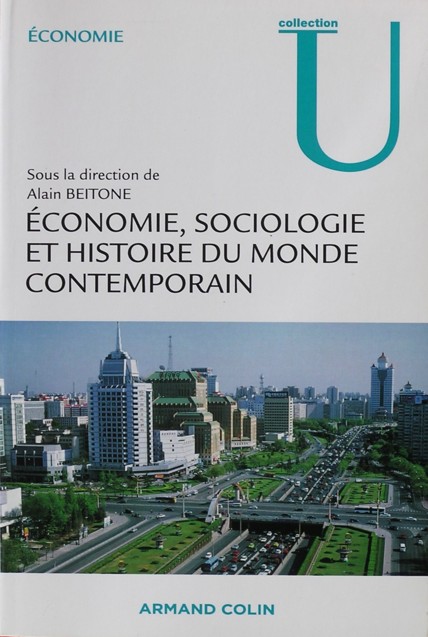

France has a rich colonial past, just like Great Britain. And although since then things have changed, the nation still derives a self-assuredness from this. France has its own culture with global aspirations. This explains perhaps, why French scientists like to set out their own national course. Thus it is for instance striking, that they make significant efforts to integrate sociology and economics. This endeavour is stimulated by the national preference for active state interventions in the private industries, an inheritance from the rule under Jean-Baptiste Colbert and Napoléon Bonaparte. This cultural peculiarity has undoubtedly also contributed to the popularity, in which for many decades the French Leninism could rejoice1. That French obstinacy makes it fascinating for foreigners to study their scientific (and other) works.
The book Économie, sociologie et histoire du monde contemporain perfectly shows that the French succeed in integrating the sociology and economics2. Alain Beitone has united ten co-authors around him, and with this writer's collective has written an impressive work of no less than 704 pages. All these authors teach in secondary education in the highest classes, which apparently are also the target group of the book. In other words, they aim at higher educated readers. The fundamentals of the sociology and economics are discussed, as well as the history of both disciplines. Since Beitone addresses the occupational education, the contents of the texts extensively study the daily practice. In short, it offers the reader a broad view on everything, which is available in sociology and economics.
This is also the limitation of the work. For, the discussion is a bird's-eye view of the various subjects, and not an elaboration. Mathematical models are almost completely absent, the recent scientific findings are merely briefly mentioned, and the schemes, figures and illustrations are kept simple. Amateurs, who want to analyze a specific theme, will have to consult another book. The habit of the writer's collective to refer mainly to the French science and its literature is interesting for foreigners. This choice is logical, considering the target group, the higher occupational education. Thus the lost foreigner yet meets the ideas and fancies, which outside France have not become popular.
The French origin also implies that one sometimes gets the feeling to travel back in time. For, the French politics still stick to state interventions in the economy, which in North-Europe has been abandoned during the eighties. Therefore the collective around Beitone refuses to reject the traditional demand policy of Keynesianism3. The authors even regularly dive deep in the past, and present theories and analyses of Karl Marx and his neomarxist successors. Here France has a long philosophical tradition, with persons such as Jean-Paul Sartre, Louis Althusser, and André Gorz. Scientifically neomarxism is unsound, but it does illustrate the national appropriation of Leninism. For North-Europeans the confrontation with these ideas causes a moment to reflect, whether perhaps yet something can be learned.
What does the writer's collective in Économie, sociologie et histoire du monde contemporain have to offer? The book has four departments. The first one is dedicated to the fundamentals of economics and of sociology. The second one describes the historical development of the industrial activities since the nineteenth century. The third department elaborates on the globalization of the economy. And the last one explains the necessity of regulating interventions by the state and by other administrative bodies in the private markets. Each department consists of three chapters, which elaborate on a specific aspect. A chapter always contains several paragraphs, which commonly are written by different authors. Apparently the authors have previously made sound arrangements, because the styles are fairly similar. The graphic layout is also uniform for all paragraphs. This is beneficial.
A review of such an enormous book can impossibly discuss all paragraphs. Generally formulated, all aspects of economics are addressed. Macro-economics and micro-economics, the industrial organization, the financial markets, development aid, the economic policy instruments of the state, the European Union, these subjects are all included. The discussion of the sociology and history are limited by their economic relevance. Thus for instance welfare economics does receive attention, but the labour sociology is absent. The names of the sociologists Adorno, Becker, Burnham, Coleman, Etzioni, Granovetter, Kahneman, Luhmann, Poulantzas, Scitovsky, Wright Mills, to name a few, are missing. Economic theoreticians such as Clark, Kalecki, Lerner, Morishima, Pasinetti, Robbins, Schmoller, Tinbergen, or Wieser are not mentioned.
On the other hand, almost all famous persons in applied economics are addressed, And also long forgotten French names such as Aftalion, Blanchard, Cantillon, Fayol, Fourastië, Malinvaud, De Montchrestien, appear. And indeed, precisely the national element is a charm of this book. In less nice words, the whole combination of economics and sociology is only cherished in France. Elsewhere in Europe and North-America this mix is rare. It makes the political perspective of the book truly centre-left4. However, above all, Beitone and his group succeed in making the reader relatively speedily at home on an economic subject of choice. Those who want to know more, can consult the references. Thus your reviewer expects to often consult Économie, sociologie et histoire du monde contemporain in the future. Is a better recommendation possible?